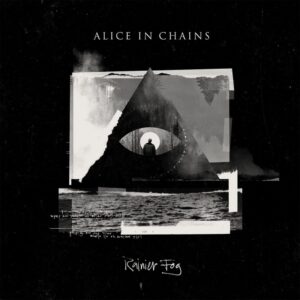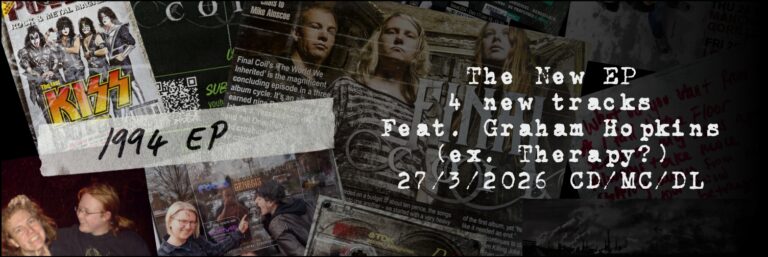In 2017, Alice in Chains turned thirty with little by way of fanfare. Their story initially seemed to be one of greatness eclipsed by tragedy and, when Layne Staley tragically passed away in 2002, it very much felt like the band was over. It was to be a long time before the band felt ready or able to return. Sporadic shows took place, usually with a revolving cast of singers, but it was Willam DuVall (who had worked with Jerry Cantrell as a solo artist) who stood out and slowly, cautiously, Alice in Chains returned to the limelight.
It was not until 2008 that the band considered entering the studio. The result, the stunning black gives way to blue, was arguably an album that the band needed to make. With the empathetic DuVall on board, Alice in Chains quietly made a record that celebrated the life of Staley and lamented his loss. It allowed both band and fans to heal and move forward, and the live shows that ensued were nothing short of seismic. A fifth album, the devil put dinosaurs here followed and it saw the band in confrontational mode, tackling religion and politics on the title track with typical forthrightness. The album featured a number of standout moments, not least the epic stone, but as a whole it lacked the variety of its predecessor.
Where the devil put dinosaurs here had an almost hypnotic sound, Rainier Fog immediately emerges in a heavier place altogether. The One You know sounds like a clash between vintage Alice, Led Zeppelin and Queens of the Stone Age; an urgent, stabbing riff giving way to lush harmonies on a chorus that moans and aches. Nick Raskulinecz (reprising his role from the previous two albums) has returned to the darker, heavier style of black gives way to blue, capturing the band’s ferocious live sound with a surprisingly raw edge. It’s still Alice in Chains, but with elements that the band have hitherto hinted at but never fully explored, and it makes for a deeply exciting opening track. Next, the album’s title track appears as a spiritual sequel to the crushing might of check my brain, the dense harmonies and taut interplay between Cantrell and DuVall’s vocals proving particularly potent. Helping to propel the song is a sense of light and shade as the band incorporate clean passages, something that was less apparent in the dense riffing of the devil puts dinosaurs here, and the album is the stronger for it. Opening with twin leads from Cantrell and DuVall, underpinned by Mike Inez’s creeping bass lines, Red giant is classic Alice in Chains. With Sean Kinney once again proving himself to be one of metal’s most underrated drummers, his percussive work is both monstrous in its weight and yet deftly innovative in its delivery. Things take a quieter turn on the lovely fly which, with its glistening leads and soaring vocal, reaches toward the sky thanks to a bright-eyed chorus and some elegant soloing in the latter half. Another example of the wider sonic palette the band are drawing from on this release, fly has a hazy psychedelic edge reminiscent of the Screaming Trees’ remarkable dust. In contrast, the band adopt a Sabbath pose as they conclude the first half of the album with the sludgy drone, a track that would not sound out of place on the band’s self-titled album with its close harmonies, Iommi riffing and intricate rhythmic patterns.
Following the lengthy metallic work-out of drone, the second half of the album kicks off with the dynamic deaf ears blind eyes, all somnolent vocals, lysergic guitars and serpentine bass. It’s an album highlight, showcasing the versatility that has always lain at the heart of Alice in Chains. Adding a touch of southern twang, maybe sees the band referencing the rich melodicism of black gives way to blue before digging into a particularly pertinent subject matter with so far under, a track that deals with the feeling of being faced with near-insurmountable odds and the impotence that results from it. Based around a wired riff and underpinned by Sean’s thunderous work on the toms, so far under is another album highlight, the band engaging with the lyrics with a bristling rage that is only partially offset by a sense that there’s a light at the end of the tunnel, no matter how far off it may seem. It leads neatly into the chrome-plated stomp of never fade, a track built around a heavy-ass riff that will undoubtedly set the mosh pit on fire when the band play it live. A track that sees the band coming to terms with their own legacy as well as that of the remarkable music scene that flourished in their native Seattle, Never Fade pays tribute to a truly remarkable group of musicians living through remarkable times. The album concludes with the prog-tinged all I am, a beautiful, seven-minute lament that ranks as one of the most heart-felt and gorgeous tracks of the band’s lengthy career. A song bookended in a wash of reverb that helps to give it a dream-like quality, it draws the blinds down on what is arguably the most satisfying of the DuVall-era records to date.
From the dense psychosis of the one you know to the elegiac conclusion of all I am, Rainier Fog never puts a foot wrong. The vocal harmonies that have long been the band’s trademark are given full-reign here but, where the devil put dinosaurs here lacked the dynamic thrust of the earlier albums, Rainier fog sees the band deftly using light and shade to drive the record forward. One of those records that greatly rewards repeated listens, Rainier Fog sees Alice in Chains on a creative high, with each track bringing something new to the table. Essential on every level. 10




